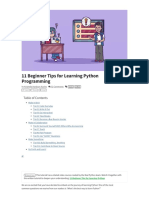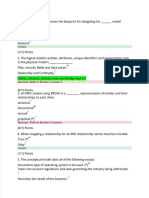0 ratings0% found this document useful (0 votes)
18 viewsPython Roadmap
This Python Learning Guide outlines a structured roadmap for beginners, starting with a crash course to grasp basic concepts, followed by a comprehensive course for deeper learning. It emphasizes the importance of practicing coding problems and working on projects to build confidence and a portfolio. Additional resources and tips for consistent practice and learning are also provided.
Uploaded by
kavya218reddyCopyright
© © All Rights Reserved
We take content rights seriously. If you suspect this is your content, claim it here.
Available Formats
Download as PDF, TXT or read online on Scribd
0 ratings0% found this document useful (0 votes)
18 viewsPython Roadmap
This Python Learning Guide outlines a structured roadmap for beginners, starting with a crash course to grasp basic concepts, followed by a comprehensive course for deeper learning. It emphasizes the importance of practicing coding problems and working on projects to build confidence and a portfolio. Additional resources and tips for consistent practice and learning are also provided.
Uploaded by
kavya218reddyCopyright
© © All Rights Reserved
We take content rights seriously. If you suspect this is your content, claim it here.
Available Formats
Download as PDF, TXT or read online on Scribd
You are on page 1/ 3
Python Learning Guide: @darshan.
hustles
Why Learn Python?
Coming from a PCMB background, I had no prior coding experience,
but I structured my learning in a way that helped me gain confidence
and clear coding tests. Here’s the exact roadmap I followed:
Step 1: Start with a Beginner-Friendly Crash Course
Before diving deep, it’s important to get familiar with Python syntax
and basic concepts.
Watch this YouTube Crash Course:
CodeWithMosh - 6-Hour Python Course
This is a great way to grasp the basics quickly in just 6 hours.
Step 2: Follow a Structured Course
Once you’re comfortable with the basics, the best way to practice
and master Python is by following a structured course.
Course: 100 Days of Code – Python by Angela Yu (Udemy)
This course teaches Python step by step with projects and hands-on
practice.
What you'll learn:
Python Fundamentals
Object-Oriented Programming (OOP)
Web Development (Flask)
Data Science Basics
Automation
Step 3: Practice Coding Problems
After learning Python concepts, solving coding problems is the key to
building confidence.
Leetcode Practice Roadmap:
1️⃣ Start with easy problems to understand problem-solving
approaches.
2️⃣ Solve patterns-based questions (arrays, strings, loops).
3️⃣ Move to medium-level problems once confident.
Recommended Topics to Cover:
Arrays & Strings
Recursion & Backtracking
Sorting & Searching
Dynamic Programming
Step 4: Work on Projects
Projects help in applying what you learned and building a portfolio.
Here are some beginner-friendly project ideas:
Simple Python Projects:
To-Do List App – Create a simple task manager using Python and
Tkinter.
Weather App – Fetch real-time weather data using an API.
Expense Tracker – Track daily expenses and store data in a CSV
file.
Password Generator – Generate strong passwords using Python.
Intermediate Python Projects:
URL Shortener – Build a Bit.ly-like URL shortener using Flask.
Web Scraper – Extract data from websites using BeautifulSoup.
Step 5: Additional Learning Resources
Important YouTube Channel:
Python Course in Engineering in Kannada – If you prefer learning
in Kannada, this channel explains concepts clearly.
Documentation & References:
Python Official Docs
W3️Schools Python
Final Tips for Python Learners
Focus on consistency – Even 1️ hour a day makes a huge
difference.
Practice coding problems – The more you solve, the better you
get.
Build real projects – Projects showcase your skills in interviews.
Read code written by others – Helps in improving logic and
understanding best practices.
You might also like
- 6 Essential Steps To Learn Python Effectively in 2025No ratings yet6 Essential Steps To Learn Python Effectively in 20257 pages
- 7 Beginner To Python Pro - Your Guide On How To Become A Python Developer - TAKEONo ratings yet7 Beginner To Python Pro - Your Guide On How To Become A Python Developer - TAKEO3 pages
- A Comprehensive Guide to Learning Python for Year 10 StudentsNo ratings yetA Comprehensive Guide to Learning Python for Year 10 Students4 pages
- Here’s a complete roadmap for learning Python, from absolute beginner to advanced topics, with resources for each step.No ratings yetHere’s a complete roadmap for learning Python, from absolute beginner to advanced topics, with resources for each step.3 pages
- 11 Beginner Tips For Learning Python Programming - Real PythonNo ratings yet11 Beginner Tips For Learning Python Programming - Real Python8 pages
- The Python Bible For Beginners 1724508132No ratings yetThe Python Bible For Beginners 1724508132186 pages
- Give Me A Roadmap To Learn Python For ProgrammingNo ratings yetGive Me A Roadmap To Learn Python For Programming11 pages
- Python Programming- A Complete Beginner's GuideNo ratings yetPython Programming- A Complete Beginner's Guide6 pages
- Define Material Requirements Planning (MRP)No ratings yetDefine Material Requirements Planning (MRP)2 pages
- Mzos, Where Learning Is Fun and Getting A Job Is Easy!No ratings yetMzos, Where Learning Is Fun and Getting A Job Is Easy!4 pages
- (Anshuman) Development of Food Ordering Application in College CanteenNo ratings yet(Anshuman) Development of Food Ordering Application in College Canteen8 pages
- Aim: Packet Capture Using Wireshark Software Filters. TheoryNo ratings yetAim: Packet Capture Using Wireshark Software Filters. Theory8 pages
- A Project Monitoring System Involves DeterminingNo ratings yetA Project Monitoring System Involves Determining26 pages
- Exercise 1) Write A Program To Calculate Average Temperature of Five Days. Create Temp Function. SolutionNo ratings yetExercise 1) Write A Program To Calculate Average Temperature of Five Days. Create Temp Function. Solution32 pages
- Downloadable List of Documents in Certikit Pci Dss Toolkit v4 CompressNo ratings yetDownloadable List of Documents in Certikit Pci Dss Toolkit v4 Compress1 page
- Data and Business Analytics Interview QuestionsNo ratings yetData and Business Analytics Interview Questions54 pages
- Canvendor Company Profile - IT ConsultingNo ratings yetCanvendor Company Profile - IT Consulting11 pages
- MAA WP 10gR2 SwitchoverFailoverBestPractices PDFNo ratings yetMAA WP 10gR2 SwitchoverFailoverBestPractices PDF23 pages
- Comparing Open Source Private Cloud Platforms PresentationNo ratings yetComparing Open Source Private Cloud Platforms Presentation35 pages
- A INTERNSHIP REPORT (VK) .......................No ratings yetA INTERNSHIP REPORT (VK) .......................34 pages

























































































